Effective Management in Healthcare: Theories and Personal Reflections
VerifiedAdded on 2022/11/24
|16
|4638
|58
Report
AI Summary
This reflective report critically examines effective management within the healthcare system, drawing upon personal experiences and established management theories. It begins with an executive summary, followed by a detailed account of a case scenario involving a communication breakdown and its impact on patient care. The report then applies various management theories, including scientific, administrative, bureaucratic, and behavioral approaches, to analyze the scenario and identify areas for improvement. Furthermore, it explores theories of personal development, such as Erikson's psychosocial theory, Maslow's hierarchy of needs, and Bronfenbrenner's ecological model, to understand effective leadership in healthcare settings. The report also addresses the influence of personality differences on perception and decision-making, as well as personal changes within healthcare environments. Finally, it discusses the health belief model and multicultural factors in healthcare, providing a comprehensive overview of the complexities of healthcare management. The report highlights the importance of communication, time management, and cultural sensitivity in promoting a positive and productive work environment.
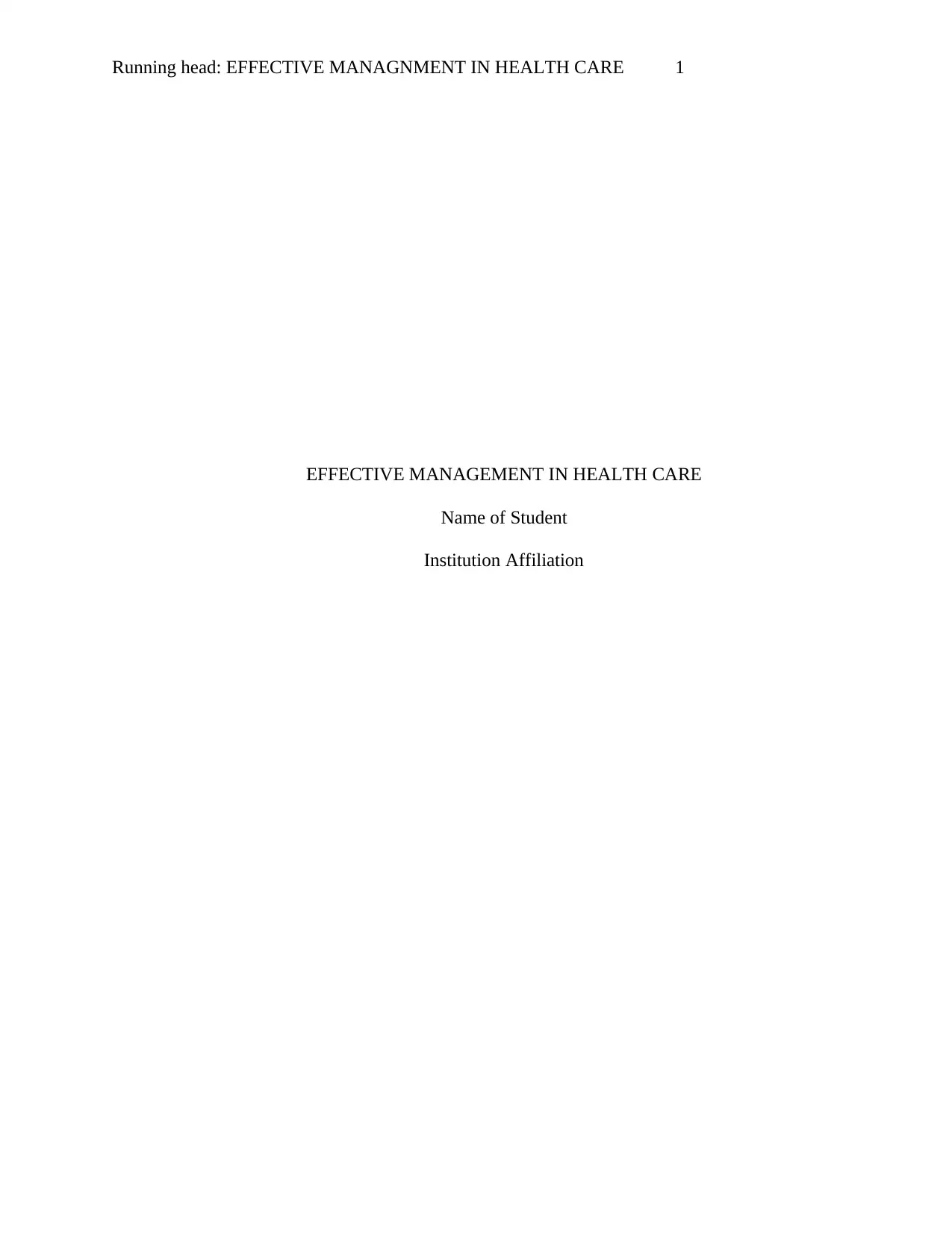
Running head: EFFECTIVE MANAGNMENT IN HEALTH CARE 1
EFFECTIVE MANAGEMENT IN HEALTH CARE
Name of Student
Institution Affiliation
EFFECTIVE MANAGEMENT IN HEALTH CARE
Name of Student
Institution Affiliation
Paraphrase This Document
Need a fresh take? Get an instant paraphrase of this document with our AI Paraphraser
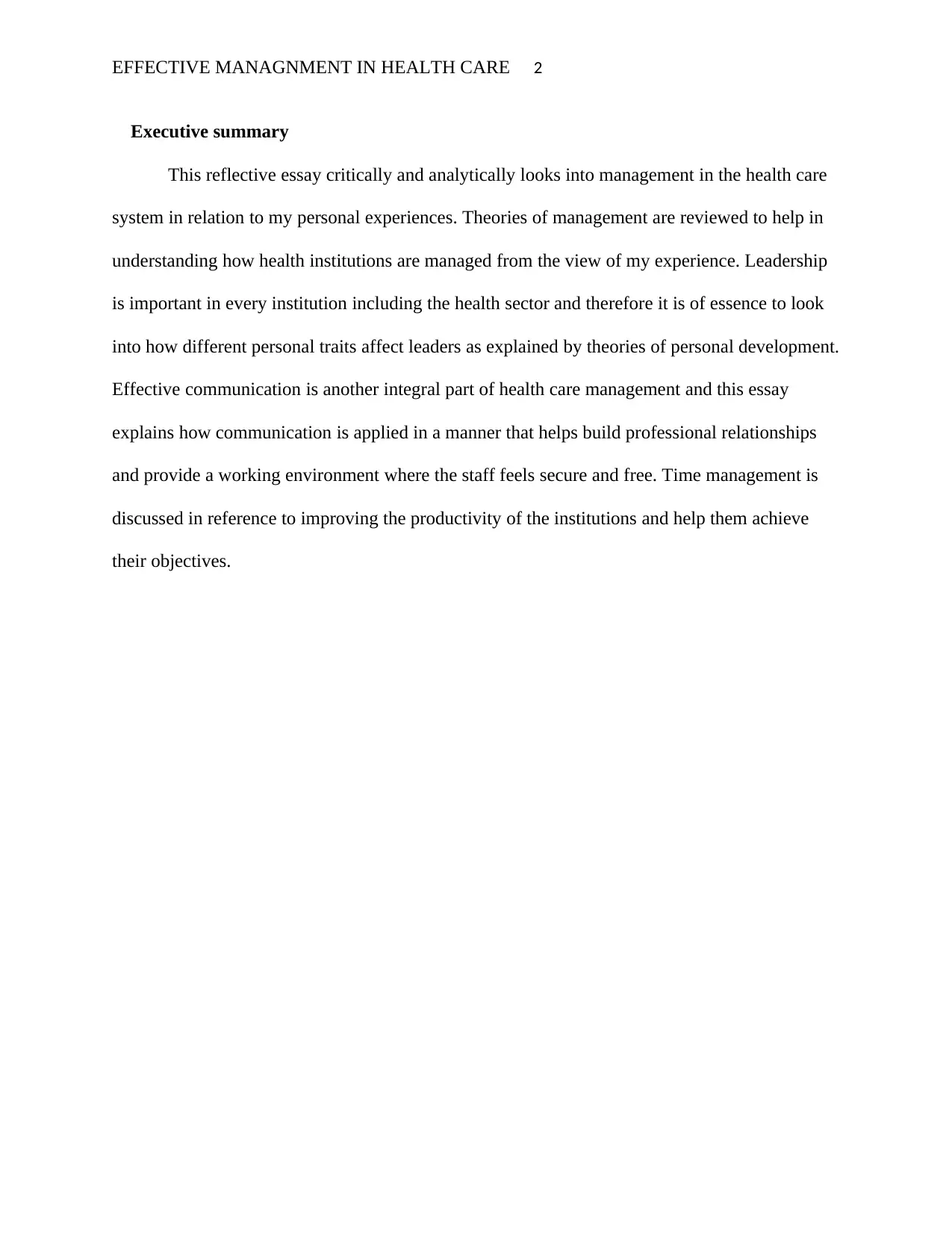
EFFECTIVE MANAGNMENT IN HEALTH CARE 2
Executive summary
This reflective essay critically and analytically looks into management in the health care
system in relation to my personal experiences. Theories of management are reviewed to help in
understanding how health institutions are managed from the view of my experience. Leadership
is important in every institution including the health sector and therefore it is of essence to look
into how different personal traits affect leaders as explained by theories of personal development.
Effective communication is another integral part of health care management and this essay
explains how communication is applied in a manner that helps build professional relationships
and provide a working environment where the staff feels secure and free. Time management is
discussed in reference to improving the productivity of the institutions and help them achieve
their objectives.
Executive summary
This reflective essay critically and analytically looks into management in the health care
system in relation to my personal experiences. Theories of management are reviewed to help in
understanding how health institutions are managed from the view of my experience. Leadership
is important in every institution including the health sector and therefore it is of essence to look
into how different personal traits affect leaders as explained by theories of personal development.
Effective communication is another integral part of health care management and this essay
explains how communication is applied in a manner that helps build professional relationships
and provide a working environment where the staff feels secure and free. Time management is
discussed in reference to improving the productivity of the institutions and help them achieve
their objectives.
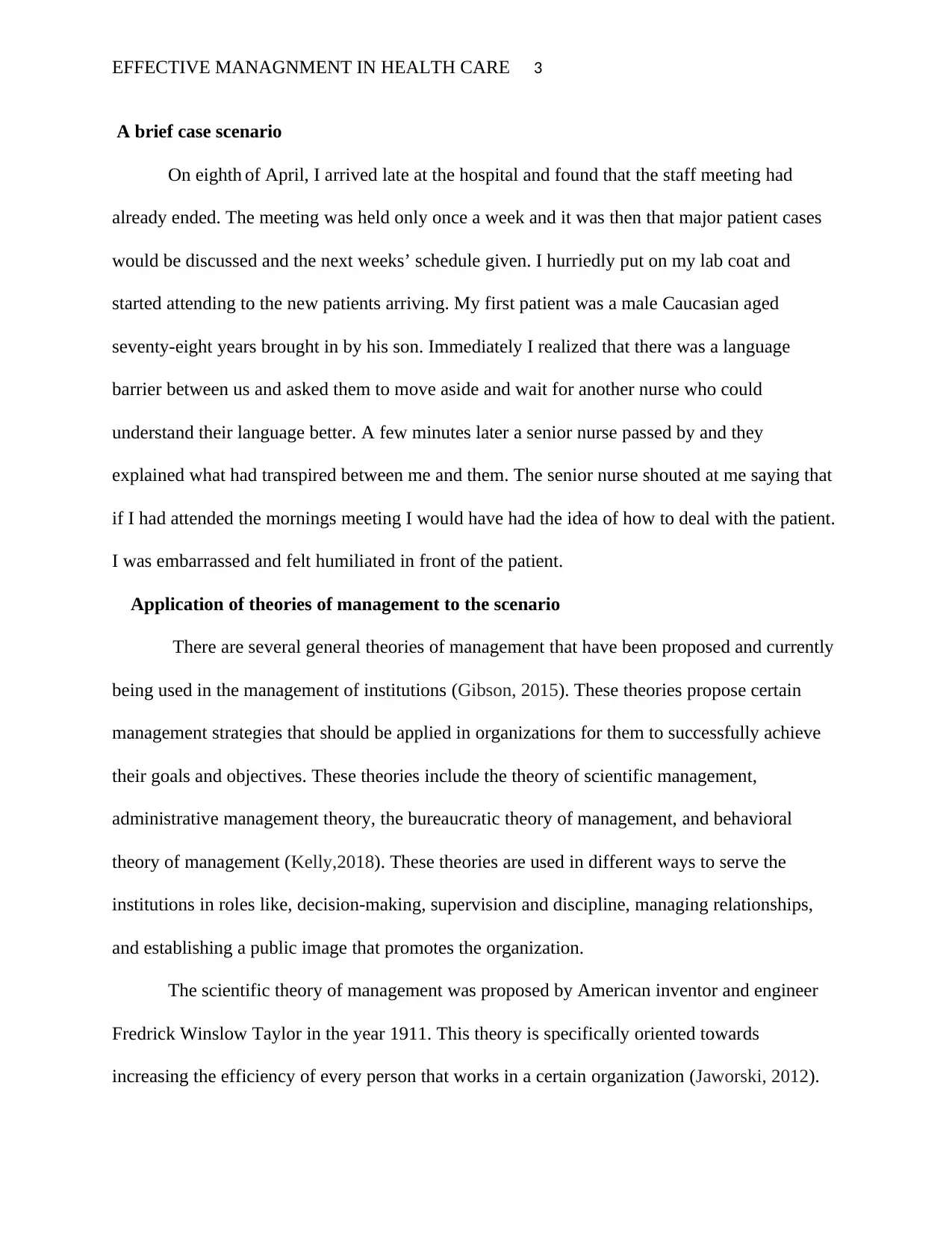
EFFECTIVE MANAGNMENT IN HEALTH CARE 3
A brief case scenario
On eighth of April, I arrived late at the hospital and found that the staff meeting had
already ended. The meeting was held only once a week and it was then that major patient cases
would be discussed and the next weeks’ schedule given. I hurriedly put on my lab coat and
started attending to the new patients arriving. My first patient was a male Caucasian aged
seventy-eight years brought in by his son. Immediately I realized that there was a language
barrier between us and asked them to move aside and wait for another nurse who could
understand their language better. A few minutes later a senior nurse passed by and they
explained what had transpired between me and them. The senior nurse shouted at me saying that
if I had attended the mornings meeting I would have had the idea of how to deal with the patient.
I was embarrassed and felt humiliated in front of the patient.
Application of theories of management to the scenario
There are several general theories of management that have been proposed and currently
being used in the management of institutions (Gibson, 2015). These theories propose certain
management strategies that should be applied in organizations for them to successfully achieve
their goals and objectives. These theories include the theory of scientific management,
administrative management theory, the bureaucratic theory of management, and behavioral
theory of management (Kelly,2018). These theories are used in different ways to serve the
institutions in roles like, decision-making, supervision and discipline, managing relationships,
and establishing a public image that promotes the organization.
The scientific theory of management was proposed by American inventor and engineer
Fredrick Winslow Taylor in the year 1911. This theory is specifically oriented towards
increasing the efficiency of every person that works in a certain organization (Jaworski, 2012).
A brief case scenario
On eighth of April, I arrived late at the hospital and found that the staff meeting had
already ended. The meeting was held only once a week and it was then that major patient cases
would be discussed and the next weeks’ schedule given. I hurriedly put on my lab coat and
started attending to the new patients arriving. My first patient was a male Caucasian aged
seventy-eight years brought in by his son. Immediately I realized that there was a language
barrier between us and asked them to move aside and wait for another nurse who could
understand their language better. A few minutes later a senior nurse passed by and they
explained what had transpired between me and them. The senior nurse shouted at me saying that
if I had attended the mornings meeting I would have had the idea of how to deal with the patient.
I was embarrassed and felt humiliated in front of the patient.
Application of theories of management to the scenario
There are several general theories of management that have been proposed and currently
being used in the management of institutions (Gibson, 2015). These theories propose certain
management strategies that should be applied in organizations for them to successfully achieve
their goals and objectives. These theories include the theory of scientific management,
administrative management theory, the bureaucratic theory of management, and behavioral
theory of management (Kelly,2018). These theories are used in different ways to serve the
institutions in roles like, decision-making, supervision and discipline, managing relationships,
and establishing a public image that promotes the organization.
The scientific theory of management was proposed by American inventor and engineer
Fredrick Winslow Taylor in the year 1911. This theory is specifically oriented towards
increasing the efficiency of every person that works in a certain organization (Jaworski, 2012).
⊘ This is a preview!⊘
Do you want full access?
Subscribe today to unlock all pages.

Trusted by 1+ million students worldwide
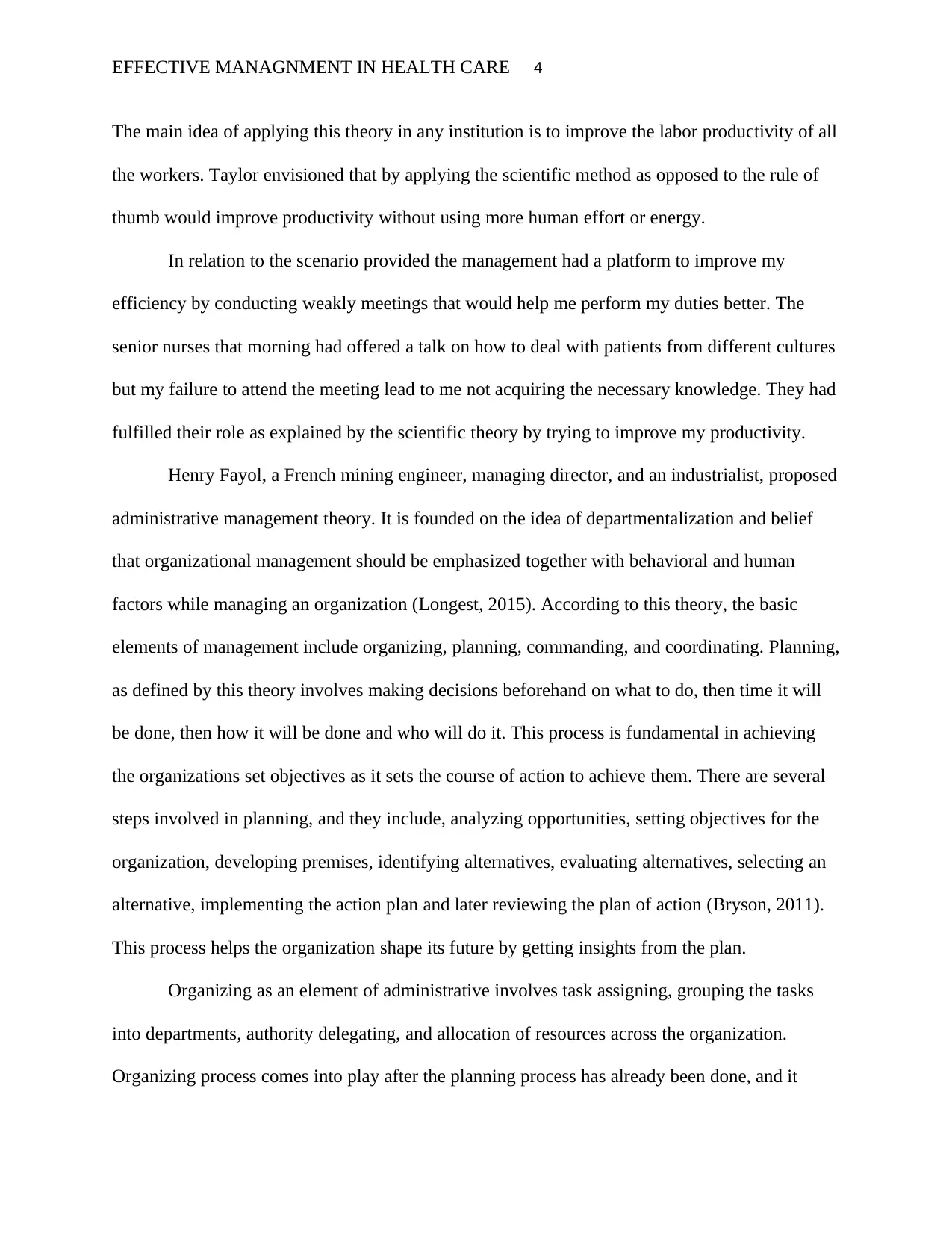
EFFECTIVE MANAGNMENT IN HEALTH CARE 4
The main idea of applying this theory in any institution is to improve the labor productivity of all
the workers. Taylor envisioned that by applying the scientific method as opposed to the rule of
thumb would improve productivity without using more human effort or energy.
In relation to the scenario provided the management had a platform to improve my
efficiency by conducting weakly meetings that would help me perform my duties better. The
senior nurses that morning had offered a talk on how to deal with patients from different cultures
but my failure to attend the meeting lead to me not acquiring the necessary knowledge. They had
fulfilled their role as explained by the scientific theory by trying to improve my productivity.
Henry Fayol, a French mining engineer, managing director, and an industrialist, proposed
administrative management theory. It is founded on the idea of departmentalization and belief
that organizational management should be emphasized together with behavioral and human
factors while managing an organization (Longest, 2015). According to this theory, the basic
elements of management include organizing, planning, commanding, and coordinating. Planning,
as defined by this theory involves making decisions beforehand on what to do, then time it will
be done, then how it will be done and who will do it. This process is fundamental in achieving
the organizations set objectives as it sets the course of action to achieve them. There are several
steps involved in planning, and they include, analyzing opportunities, setting objectives for the
organization, developing premises, identifying alternatives, evaluating alternatives, selecting an
alternative, implementing the action plan and later reviewing the plan of action (Bryson, 2011).
This process helps the organization shape its future by getting insights from the plan.
Organizing as an element of administrative involves task assigning, grouping the tasks
into departments, authority delegating, and allocation of resources across the organization.
Organizing process comes into play after the planning process has already been done, and it
The main idea of applying this theory in any institution is to improve the labor productivity of all
the workers. Taylor envisioned that by applying the scientific method as opposed to the rule of
thumb would improve productivity without using more human effort or energy.
In relation to the scenario provided the management had a platform to improve my
efficiency by conducting weakly meetings that would help me perform my duties better. The
senior nurses that morning had offered a talk on how to deal with patients from different cultures
but my failure to attend the meeting lead to me not acquiring the necessary knowledge. They had
fulfilled their role as explained by the scientific theory by trying to improve my productivity.
Henry Fayol, a French mining engineer, managing director, and an industrialist, proposed
administrative management theory. It is founded on the idea of departmentalization and belief
that organizational management should be emphasized together with behavioral and human
factors while managing an organization (Longest, 2015). According to this theory, the basic
elements of management include organizing, planning, commanding, and coordinating. Planning,
as defined by this theory involves making decisions beforehand on what to do, then time it will
be done, then how it will be done and who will do it. This process is fundamental in achieving
the organizations set objectives as it sets the course of action to achieve them. There are several
steps involved in planning, and they include, analyzing opportunities, setting objectives for the
organization, developing premises, identifying alternatives, evaluating alternatives, selecting an
alternative, implementing the action plan and later reviewing the plan of action (Bryson, 2011).
This process helps the organization shape its future by getting insights from the plan.
Organizing as an element of administrative involves task assigning, grouping the tasks
into departments, authority delegating, and allocation of resources across the organization.
Organizing process comes into play after the planning process has already been done, and it
Paraphrase This Document
Need a fresh take? Get an instant paraphrase of this document with our AI Paraphraser
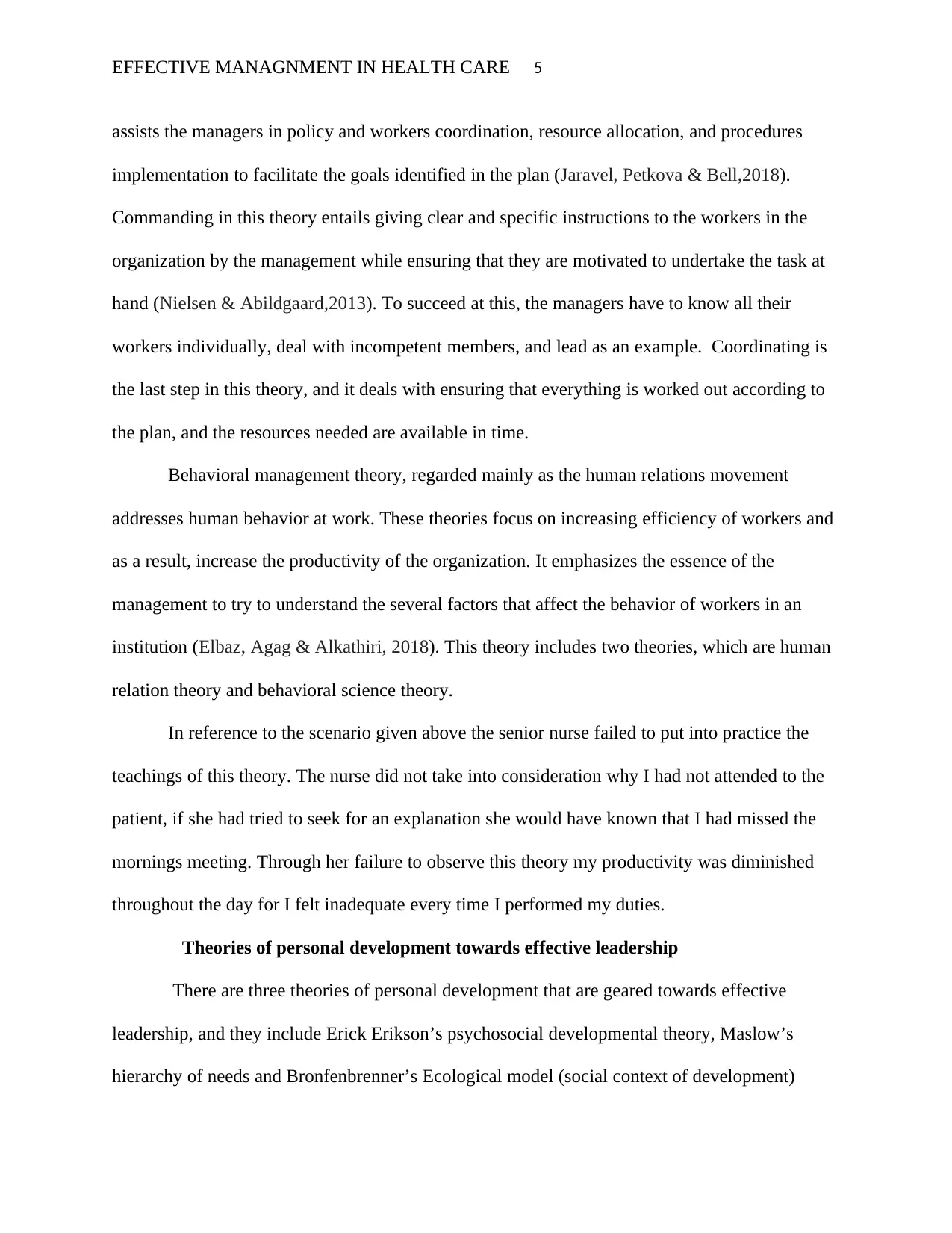
EFFECTIVE MANAGNMENT IN HEALTH CARE 5
assists the managers in policy and workers coordination, resource allocation, and procedures
implementation to facilitate the goals identified in the plan (Jaravel, Petkova & Bell,2018).
Commanding in this theory entails giving clear and specific instructions to the workers in the
organization by the management while ensuring that they are motivated to undertake the task at
hand (Nielsen & Abildgaard,2013). To succeed at this, the managers have to know all their
workers individually, deal with incompetent members, and lead as an example. Coordinating is
the last step in this theory, and it deals with ensuring that everything is worked out according to
the plan, and the resources needed are available in time.
Behavioral management theory, regarded mainly as the human relations movement
addresses human behavior at work. These theories focus on increasing efficiency of workers and
as a result, increase the productivity of the organization. It emphasizes the essence of the
management to try to understand the several factors that affect the behavior of workers in an
institution (Elbaz, Agag & Alkathiri, 2018). This theory includes two theories, which are human
relation theory and behavioral science theory.
In reference to the scenario given above the senior nurse failed to put into practice the
teachings of this theory. The nurse did not take into consideration why I had not attended to the
patient, if she had tried to seek for an explanation she would have known that I had missed the
mornings meeting. Through her failure to observe this theory my productivity was diminished
throughout the day for I felt inadequate every time I performed my duties.
Theories of personal development towards effective leadership
There are three theories of personal development that are geared towards effective
leadership, and they include Erick Erikson’s psychosocial developmental theory, Maslow’s
hierarchy of needs and Bronfenbrenner’s Ecological model (social context of development)
assists the managers in policy and workers coordination, resource allocation, and procedures
implementation to facilitate the goals identified in the plan (Jaravel, Petkova & Bell,2018).
Commanding in this theory entails giving clear and specific instructions to the workers in the
organization by the management while ensuring that they are motivated to undertake the task at
hand (Nielsen & Abildgaard,2013). To succeed at this, the managers have to know all their
workers individually, deal with incompetent members, and lead as an example. Coordinating is
the last step in this theory, and it deals with ensuring that everything is worked out according to
the plan, and the resources needed are available in time.
Behavioral management theory, regarded mainly as the human relations movement
addresses human behavior at work. These theories focus on increasing efficiency of workers and
as a result, increase the productivity of the organization. It emphasizes the essence of the
management to try to understand the several factors that affect the behavior of workers in an
institution (Elbaz, Agag & Alkathiri, 2018). This theory includes two theories, which are human
relation theory and behavioral science theory.
In reference to the scenario given above the senior nurse failed to put into practice the
teachings of this theory. The nurse did not take into consideration why I had not attended to the
patient, if she had tried to seek for an explanation she would have known that I had missed the
mornings meeting. Through her failure to observe this theory my productivity was diminished
throughout the day for I felt inadequate every time I performed my duties.
Theories of personal development towards effective leadership
There are three theories of personal development that are geared towards effective
leadership, and they include Erick Erikson’s psychosocial developmental theory, Maslow’s
hierarchy of needs and Bronfenbrenner’s Ecological model (social context of development)
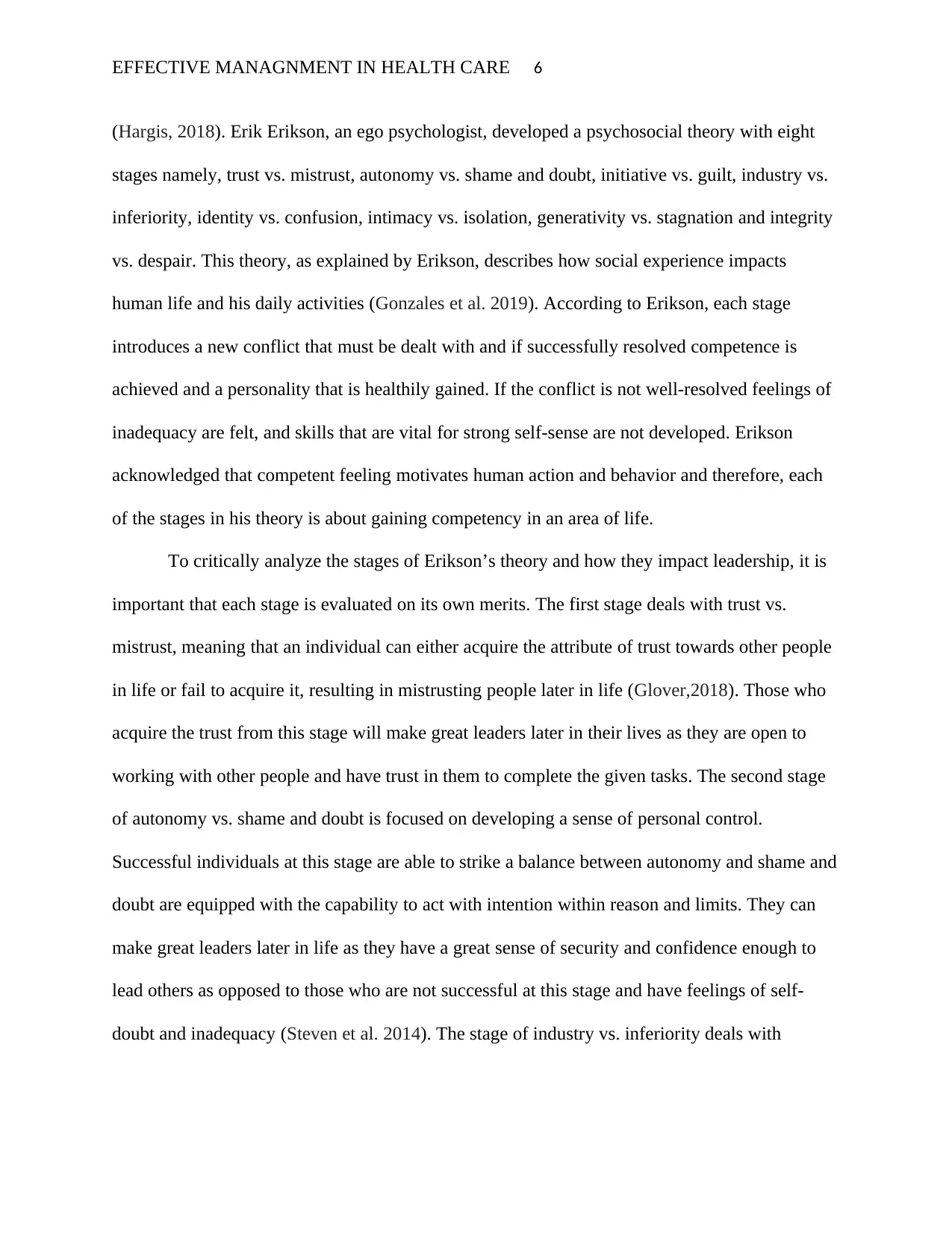
EFFECTIVE MANAGNMENT IN HEALTH CARE 6
(Hargis, 2018). Erik Erikson, an ego psychologist, developed a psychosocial theory with eight
stages namely, trust vs. mistrust, autonomy vs. shame and doubt, initiative vs. guilt, industry vs.
inferiority, identity vs. confusion, intimacy vs. isolation, generativity vs. stagnation and integrity
vs. despair. This theory, as explained by Erikson, describes how social experience impacts
human life and his daily activities (Gonzales et al. 2019). According to Erikson, each stage
introduces a new conflict that must be dealt with and if successfully resolved competence is
achieved and a personality that is healthily gained. If the conflict is not well-resolved feelings of
inadequacy are felt, and skills that are vital for strong self-sense are not developed. Erikson
acknowledged that competent feeling motivates human action and behavior and therefore, each
of the stages in his theory is about gaining competency in an area of life.
To critically analyze the stages of Erikson’s theory and how they impact leadership, it is
important that each stage is evaluated on its own merits. The first stage deals with trust vs.
mistrust, meaning that an individual can either acquire the attribute of trust towards other people
in life or fail to acquire it, resulting in mistrusting people later in life (Glover,2018). Those who
acquire the trust from this stage will make great leaders later in their lives as they are open to
working with other people and have trust in them to complete the given tasks. The second stage
of autonomy vs. shame and doubt is focused on developing a sense of personal control.
Successful individuals at this stage are able to strike a balance between autonomy and shame and
doubt are equipped with the capability to act with intention within reason and limits. They can
make great leaders later in life as they have a great sense of security and confidence enough to
lead others as opposed to those who are not successful at this stage and have feelings of self-
doubt and inadequacy (Steven et al. 2014). The stage of industry vs. inferiority deals with
(Hargis, 2018). Erik Erikson, an ego psychologist, developed a psychosocial theory with eight
stages namely, trust vs. mistrust, autonomy vs. shame and doubt, initiative vs. guilt, industry vs.
inferiority, identity vs. confusion, intimacy vs. isolation, generativity vs. stagnation and integrity
vs. despair. This theory, as explained by Erikson, describes how social experience impacts
human life and his daily activities (Gonzales et al. 2019). According to Erikson, each stage
introduces a new conflict that must be dealt with and if successfully resolved competence is
achieved and a personality that is healthily gained. If the conflict is not well-resolved feelings of
inadequacy are felt, and skills that are vital for strong self-sense are not developed. Erikson
acknowledged that competent feeling motivates human action and behavior and therefore, each
of the stages in his theory is about gaining competency in an area of life.
To critically analyze the stages of Erikson’s theory and how they impact leadership, it is
important that each stage is evaluated on its own merits. The first stage deals with trust vs.
mistrust, meaning that an individual can either acquire the attribute of trust towards other people
in life or fail to acquire it, resulting in mistrusting people later in life (Glover,2018). Those who
acquire the trust from this stage will make great leaders later in their lives as they are open to
working with other people and have trust in them to complete the given tasks. The second stage
of autonomy vs. shame and doubt is focused on developing a sense of personal control.
Successful individuals at this stage are able to strike a balance between autonomy and shame and
doubt are equipped with the capability to act with intention within reason and limits. They can
make great leaders later in life as they have a great sense of security and confidence enough to
lead others as opposed to those who are not successful at this stage and have feelings of self-
doubt and inadequacy (Steven et al. 2014). The stage of industry vs. inferiority deals with
⊘ This is a preview!⊘
Do you want full access?
Subscribe today to unlock all pages.

Trusted by 1+ million students worldwide
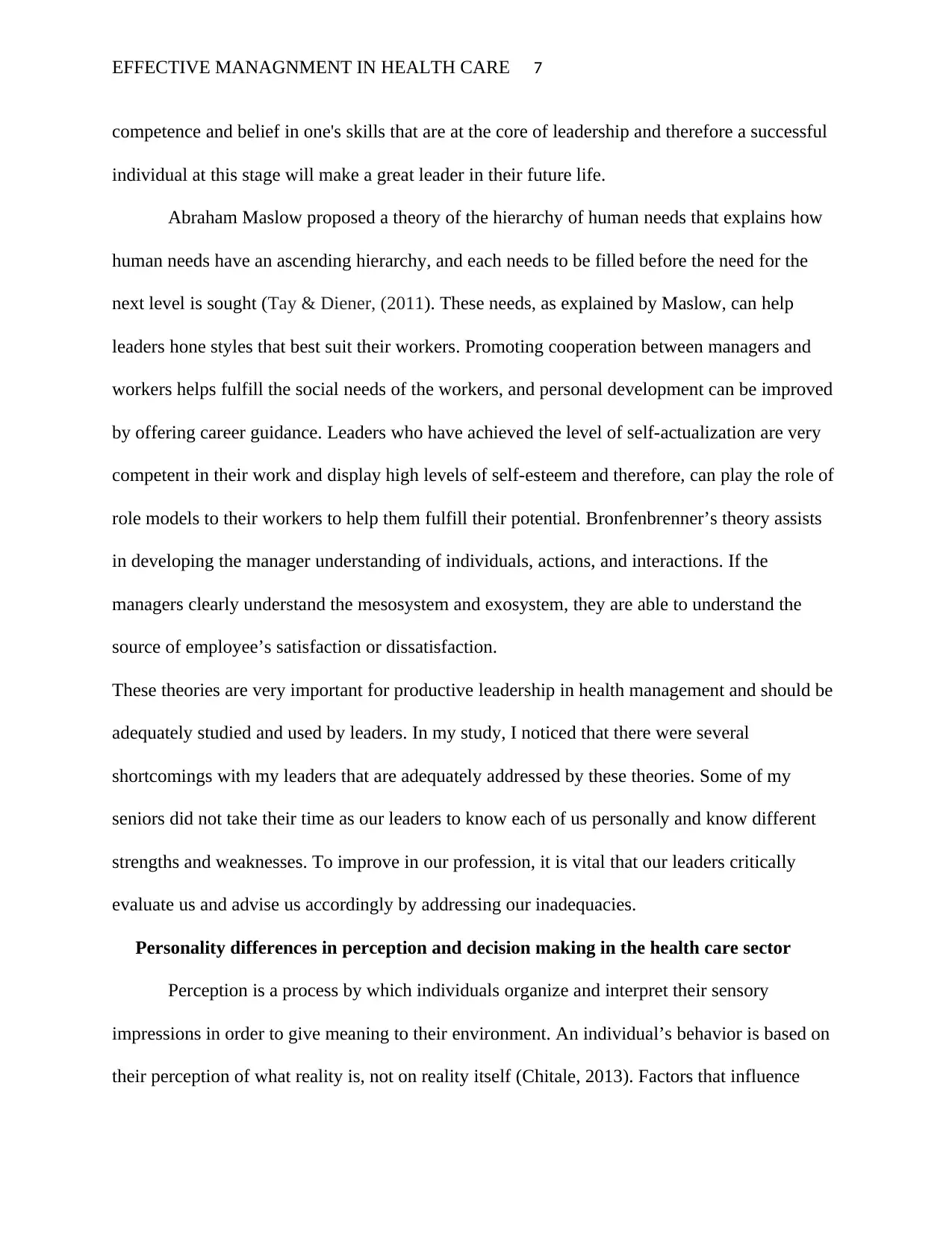
EFFECTIVE MANAGNMENT IN HEALTH CARE 7
competence and belief in one's skills that are at the core of leadership and therefore a successful
individual at this stage will make a great leader in their future life.
Abraham Maslow proposed a theory of the hierarchy of human needs that explains how
human needs have an ascending hierarchy, and each needs to be filled before the need for the
next level is sought (Tay & Diener, (2011). These needs, as explained by Maslow, can help
leaders hone styles that best suit their workers. Promoting cooperation between managers and
workers helps fulfill the social needs of the workers, and personal development can be improved
by offering career guidance. Leaders who have achieved the level of self-actualization are very
competent in their work and display high levels of self-esteem and therefore, can play the role of
role models to their workers to help them fulfill their potential. Bronfenbrenner’s theory assists
in developing the manager understanding of individuals, actions, and interactions. If the
managers clearly understand the mesosystem and exosystem, they are able to understand the
source of employee’s satisfaction or dissatisfaction.
These theories are very important for productive leadership in health management and should be
adequately studied and used by leaders. In my study, I noticed that there were several
shortcomings with my leaders that are adequately addressed by these theories. Some of my
seniors did not take their time as our leaders to know each of us personally and know different
strengths and weaknesses. To improve in our profession, it is vital that our leaders critically
evaluate us and advise us accordingly by addressing our inadequacies.
Personality differences in perception and decision making in the health care sector
Perception is a process by which individuals organize and interpret their sensory
impressions in order to give meaning to their environment. An individual’s behavior is based on
their perception of what reality is, not on reality itself (Chitale, 2013). Factors that influence
competence and belief in one's skills that are at the core of leadership and therefore a successful
individual at this stage will make a great leader in their future life.
Abraham Maslow proposed a theory of the hierarchy of human needs that explains how
human needs have an ascending hierarchy, and each needs to be filled before the need for the
next level is sought (Tay & Diener, (2011). These needs, as explained by Maslow, can help
leaders hone styles that best suit their workers. Promoting cooperation between managers and
workers helps fulfill the social needs of the workers, and personal development can be improved
by offering career guidance. Leaders who have achieved the level of self-actualization are very
competent in their work and display high levels of self-esteem and therefore, can play the role of
role models to their workers to help them fulfill their potential. Bronfenbrenner’s theory assists
in developing the manager understanding of individuals, actions, and interactions. If the
managers clearly understand the mesosystem and exosystem, they are able to understand the
source of employee’s satisfaction or dissatisfaction.
These theories are very important for productive leadership in health management and should be
adequately studied and used by leaders. In my study, I noticed that there were several
shortcomings with my leaders that are adequately addressed by these theories. Some of my
seniors did not take their time as our leaders to know each of us personally and know different
strengths and weaknesses. To improve in our profession, it is vital that our leaders critically
evaluate us and advise us accordingly by addressing our inadequacies.
Personality differences in perception and decision making in the health care sector
Perception is a process by which individuals organize and interpret their sensory
impressions in order to give meaning to their environment. An individual’s behavior is based on
their perception of what reality is, not on reality itself (Chitale, 2013). Factors that influence
Paraphrase This Document
Need a fresh take? Get an instant paraphrase of this document with our AI Paraphraser
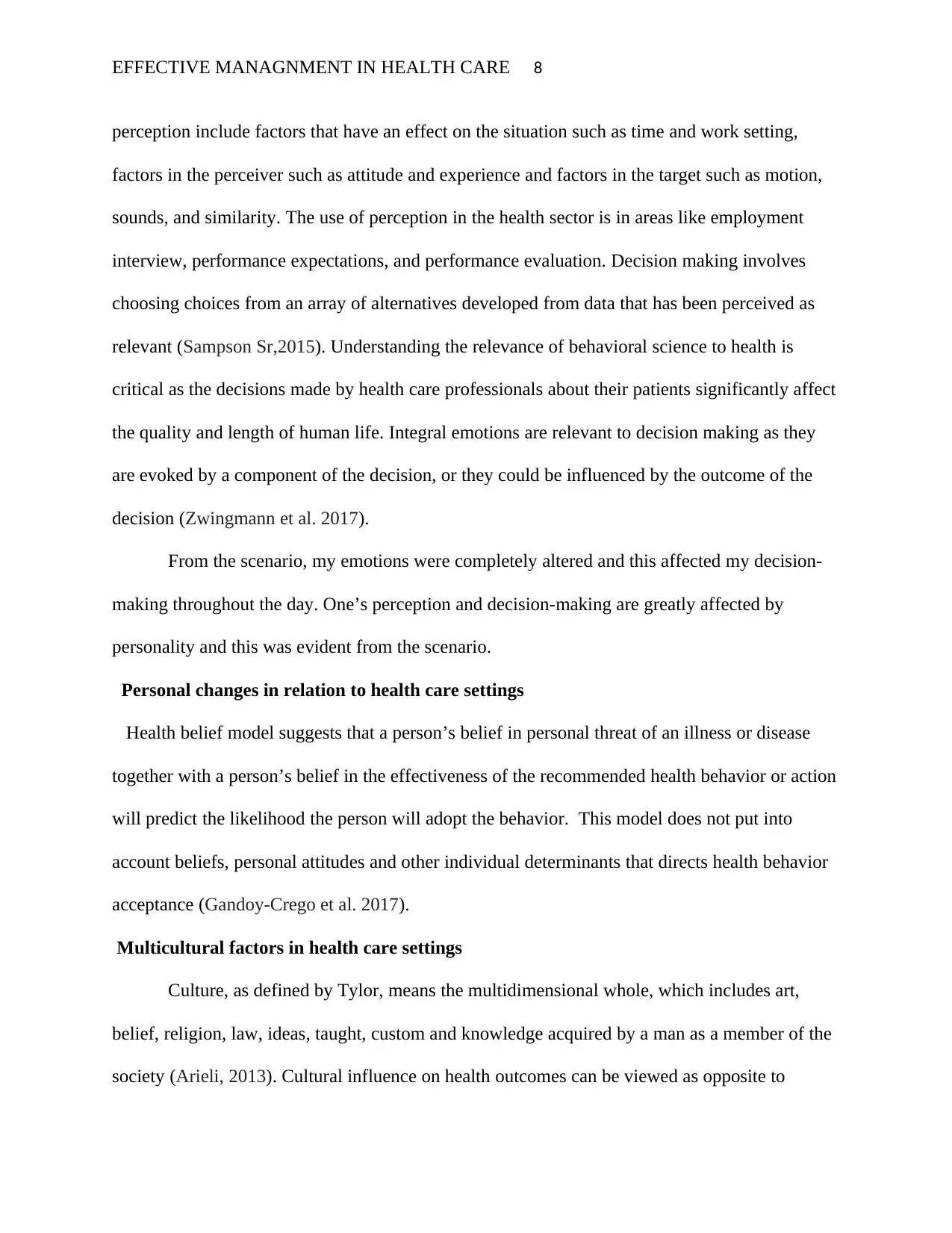
EFFECTIVE MANAGNMENT IN HEALTH CARE 8
perception include factors that have an effect on the situation such as time and work setting,
factors in the perceiver such as attitude and experience and factors in the target such as motion,
sounds, and similarity. The use of perception in the health sector is in areas like employment
interview, performance expectations, and performance evaluation. Decision making involves
choosing choices from an array of alternatives developed from data that has been perceived as
relevant (Sampson Sr,2015). Understanding the relevance of behavioral science to health is
critical as the decisions made by health care professionals about their patients significantly affect
the quality and length of human life. Integral emotions are relevant to decision making as they
are evoked by a component of the decision, or they could be influenced by the outcome of the
decision (Zwingmann et al. 2017).
From the scenario, my emotions were completely altered and this affected my decision-
making throughout the day. One’s perception and decision-making are greatly affected by
personality and this was evident from the scenario.
Personal changes in relation to health care settings
Health belief model suggests that a person’s belief in personal threat of an illness or disease
together with a person’s belief in the effectiveness of the recommended health behavior or action
will predict the likelihood the person will adopt the behavior. This model does not put into
account beliefs, personal attitudes and other individual determinants that directs health behavior
acceptance (Gandoy-Crego et al. 2017).
Multicultural factors in health care settings
Culture, as defined by Tylor, means the multidimensional whole, which includes art,
belief, religion, law, ideas, taught, custom and knowledge acquired by a man as a member of the
society (Arieli, 2013). Cultural influence on health outcomes can be viewed as opposite to
perception include factors that have an effect on the situation such as time and work setting,
factors in the perceiver such as attitude and experience and factors in the target such as motion,
sounds, and similarity. The use of perception in the health sector is in areas like employment
interview, performance expectations, and performance evaluation. Decision making involves
choosing choices from an array of alternatives developed from data that has been perceived as
relevant (Sampson Sr,2015). Understanding the relevance of behavioral science to health is
critical as the decisions made by health care professionals about their patients significantly affect
the quality and length of human life. Integral emotions are relevant to decision making as they
are evoked by a component of the decision, or they could be influenced by the outcome of the
decision (Zwingmann et al. 2017).
From the scenario, my emotions were completely altered and this affected my decision-
making throughout the day. One’s perception and decision-making are greatly affected by
personality and this was evident from the scenario.
Personal changes in relation to health care settings
Health belief model suggests that a person’s belief in personal threat of an illness or disease
together with a person’s belief in the effectiveness of the recommended health behavior or action
will predict the likelihood the person will adopt the behavior. This model does not put into
account beliefs, personal attitudes and other individual determinants that directs health behavior
acceptance (Gandoy-Crego et al. 2017).
Multicultural factors in health care settings
Culture, as defined by Tylor, means the multidimensional whole, which includes art,
belief, religion, law, ideas, taught, custom and knowledge acquired by a man as a member of the
society (Arieli, 2013). Cultural influence on health outcomes can be viewed as opposite to
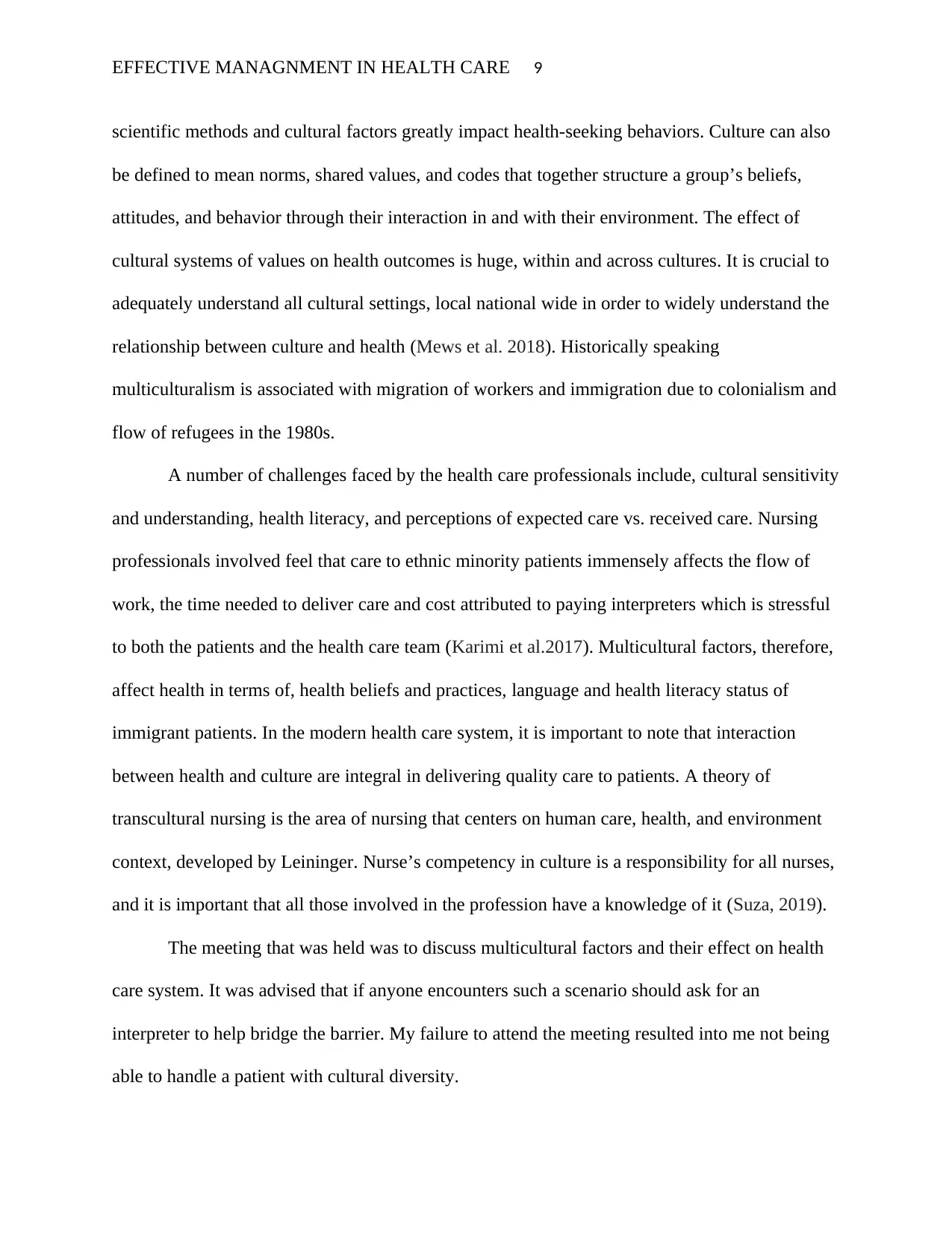
EFFECTIVE MANAGNMENT IN HEALTH CARE 9
scientific methods and cultural factors greatly impact health-seeking behaviors. Culture can also
be defined to mean norms, shared values, and codes that together structure a group’s beliefs,
attitudes, and behavior through their interaction in and with their environment. The effect of
cultural systems of values on health outcomes is huge, within and across cultures. It is crucial to
adequately understand all cultural settings, local national wide in order to widely understand the
relationship between culture and health (Mews et al. 2018). Historically speaking
multiculturalism is associated with migration of workers and immigration due to colonialism and
flow of refugees in the 1980s.
A number of challenges faced by the health care professionals include, cultural sensitivity
and understanding, health literacy, and perceptions of expected care vs. received care. Nursing
professionals involved feel that care to ethnic minority patients immensely affects the flow of
work, the time needed to deliver care and cost attributed to paying interpreters which is stressful
to both the patients and the health care team (Karimi et al.2017). Multicultural factors, therefore,
affect health in terms of, health beliefs and practices, language and health literacy status of
immigrant patients. In the modern health care system, it is important to note that interaction
between health and culture are integral in delivering quality care to patients. A theory of
transcultural nursing is the area of nursing that centers on human care, health, and environment
context, developed by Leininger. Nurse’s competency in culture is a responsibility for all nurses,
and it is important that all those involved in the profession have a knowledge of it (Suza, 2019).
The meeting that was held was to discuss multicultural factors and their effect on health
care system. It was advised that if anyone encounters such a scenario should ask for an
interpreter to help bridge the barrier. My failure to attend the meeting resulted into me not being
able to handle a patient with cultural diversity.
scientific methods and cultural factors greatly impact health-seeking behaviors. Culture can also
be defined to mean norms, shared values, and codes that together structure a group’s beliefs,
attitudes, and behavior through their interaction in and with their environment. The effect of
cultural systems of values on health outcomes is huge, within and across cultures. It is crucial to
adequately understand all cultural settings, local national wide in order to widely understand the
relationship between culture and health (Mews et al. 2018). Historically speaking
multiculturalism is associated with migration of workers and immigration due to colonialism and
flow of refugees in the 1980s.
A number of challenges faced by the health care professionals include, cultural sensitivity
and understanding, health literacy, and perceptions of expected care vs. received care. Nursing
professionals involved feel that care to ethnic minority patients immensely affects the flow of
work, the time needed to deliver care and cost attributed to paying interpreters which is stressful
to both the patients and the health care team (Karimi et al.2017). Multicultural factors, therefore,
affect health in terms of, health beliefs and practices, language and health literacy status of
immigrant patients. In the modern health care system, it is important to note that interaction
between health and culture are integral in delivering quality care to patients. A theory of
transcultural nursing is the area of nursing that centers on human care, health, and environment
context, developed by Leininger. Nurse’s competency in culture is a responsibility for all nurses,
and it is important that all those involved in the profession have a knowledge of it (Suza, 2019).
The meeting that was held was to discuss multicultural factors and their effect on health
care system. It was advised that if anyone encounters such a scenario should ask for an
interpreter to help bridge the barrier. My failure to attend the meeting resulted into me not being
able to handle a patient with cultural diversity.
⊘ This is a preview!⊘
Do you want full access?
Subscribe today to unlock all pages.

Trusted by 1+ million students worldwide
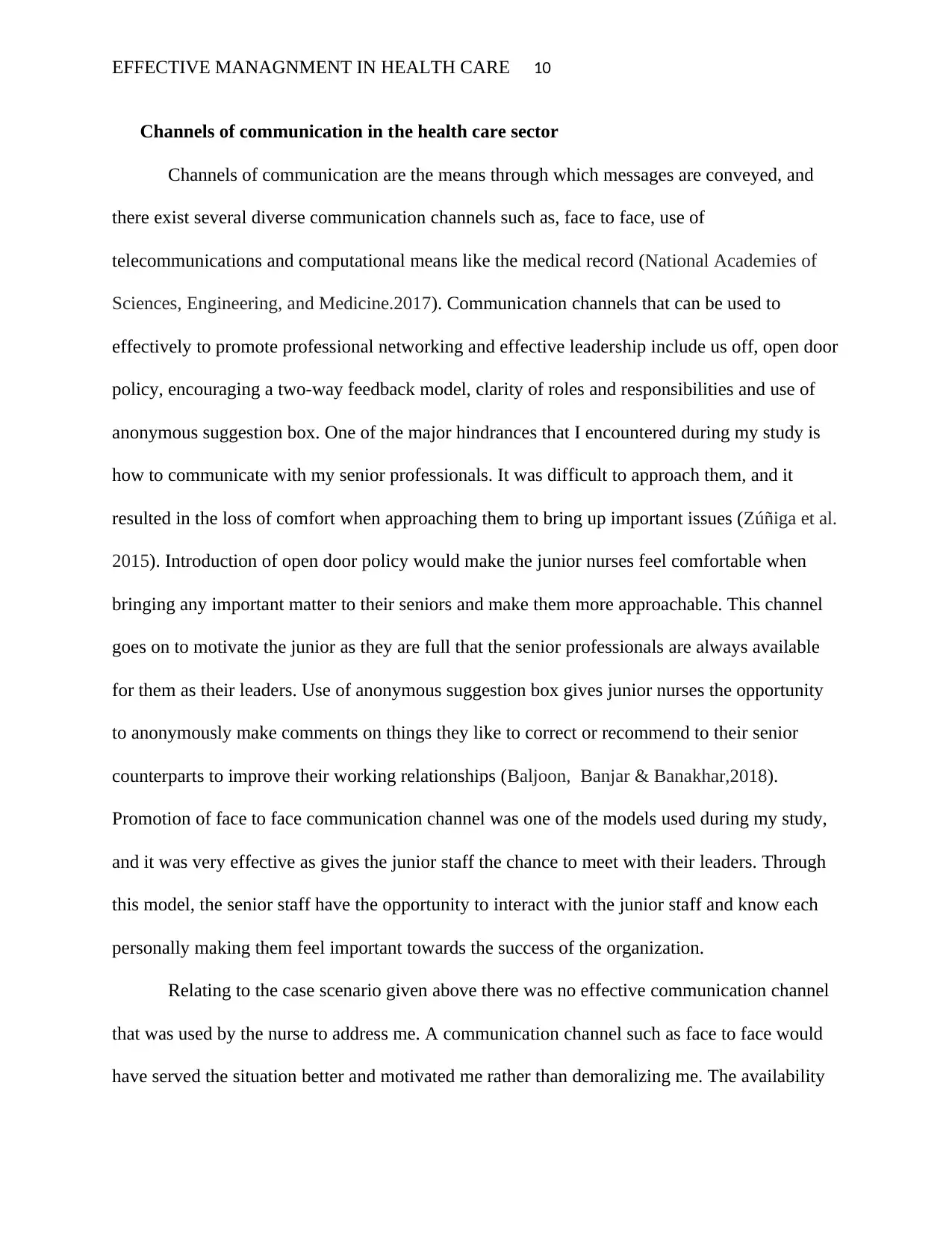
EFFECTIVE MANAGNMENT IN HEALTH CARE 10
Channels of communication in the health care sector
Channels of communication are the means through which messages are conveyed, and
there exist several diverse communication channels such as, face to face, use of
telecommunications and computational means like the medical record (National Academies of
Sciences, Engineering, and Medicine.2017). Communication channels that can be used to
effectively to promote professional networking and effective leadership include us off, open door
policy, encouraging a two-way feedback model, clarity of roles and responsibilities and use of
anonymous suggestion box. One of the major hindrances that I encountered during my study is
how to communicate with my senior professionals. It was difficult to approach them, and it
resulted in the loss of comfort when approaching them to bring up important issues (Zúñiga et al.
2015). Introduction of open door policy would make the junior nurses feel comfortable when
bringing any important matter to their seniors and make them more approachable. This channel
goes on to motivate the junior as they are full that the senior professionals are always available
for them as their leaders. Use of anonymous suggestion box gives junior nurses the opportunity
to anonymously make comments on things they like to correct or recommend to their senior
counterparts to improve their working relationships (Baljoon, Banjar & Banakhar,2018).
Promotion of face to face communication channel was one of the models used during my study,
and it was very effective as gives the junior staff the chance to meet with their leaders. Through
this model, the senior staff have the opportunity to interact with the junior staff and know each
personally making them feel important towards the success of the organization.
Relating to the case scenario given above there was no effective communication channel
that was used by the nurse to address me. A communication channel such as face to face would
have served the situation better and motivated me rather than demoralizing me. The availability
Channels of communication in the health care sector
Channels of communication are the means through which messages are conveyed, and
there exist several diverse communication channels such as, face to face, use of
telecommunications and computational means like the medical record (National Academies of
Sciences, Engineering, and Medicine.2017). Communication channels that can be used to
effectively to promote professional networking and effective leadership include us off, open door
policy, encouraging a two-way feedback model, clarity of roles and responsibilities and use of
anonymous suggestion box. One of the major hindrances that I encountered during my study is
how to communicate with my senior professionals. It was difficult to approach them, and it
resulted in the loss of comfort when approaching them to bring up important issues (Zúñiga et al.
2015). Introduction of open door policy would make the junior nurses feel comfortable when
bringing any important matter to their seniors and make them more approachable. This channel
goes on to motivate the junior as they are full that the senior professionals are always available
for them as their leaders. Use of anonymous suggestion box gives junior nurses the opportunity
to anonymously make comments on things they like to correct or recommend to their senior
counterparts to improve their working relationships (Baljoon, Banjar & Banakhar,2018).
Promotion of face to face communication channel was one of the models used during my study,
and it was very effective as gives the junior staff the chance to meet with their leaders. Through
this model, the senior staff have the opportunity to interact with the junior staff and know each
personally making them feel important towards the success of the organization.
Relating to the case scenario given above there was no effective communication channel
that was used by the nurse to address me. A communication channel such as face to face would
have served the situation better and motivated me rather than demoralizing me. The availability
Paraphrase This Document
Need a fresh take? Get an instant paraphrase of this document with our AI Paraphraser
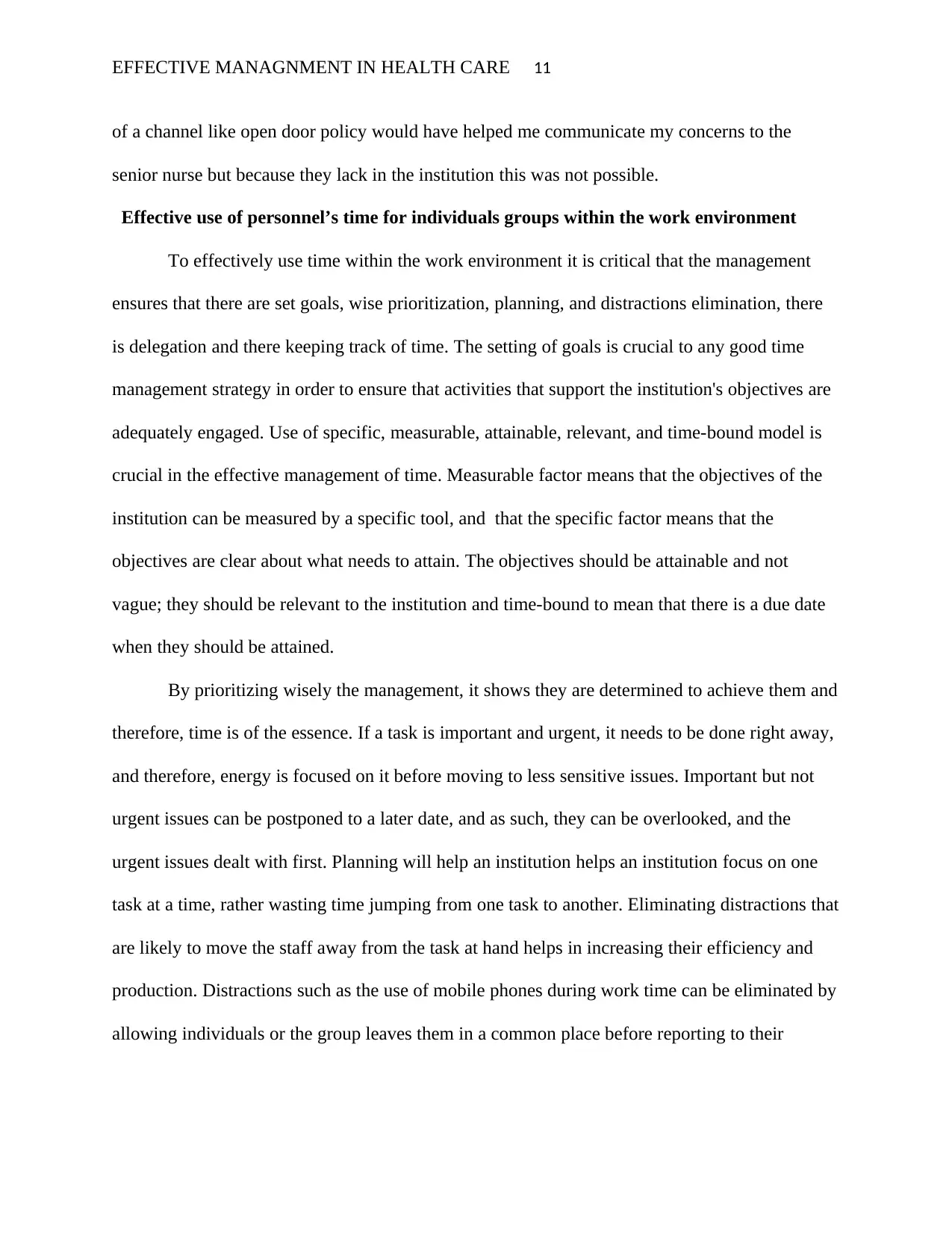
EFFECTIVE MANAGNMENT IN HEALTH CARE 11
of a channel like open door policy would have helped me communicate my concerns to the
senior nurse but because they lack in the institution this was not possible.
Effective use of personnel’s time for individuals groups within the work environment
To effectively use time within the work environment it is critical that the management
ensures that there are set goals, wise prioritization, planning, and distractions elimination, there
is delegation and there keeping track of time. The setting of goals is crucial to any good time
management strategy in order to ensure that activities that support the institution's objectives are
adequately engaged. Use of specific, measurable, attainable, relevant, and time-bound model is
crucial in the effective management of time. Measurable factor means that the objectives of the
institution can be measured by a specific tool, and that the specific factor means that the
objectives are clear about what needs to attain. The objectives should be attainable and not
vague; they should be relevant to the institution and time-bound to mean that there is a due date
when they should be attained.
By prioritizing wisely the management, it shows they are determined to achieve them and
therefore, time is of the essence. If a task is important and urgent, it needs to be done right away,
and therefore, energy is focused on it before moving to less sensitive issues. Important but not
urgent issues can be postponed to a later date, and as such, they can be overlooked, and the
urgent issues dealt with first. Planning will help an institution helps an institution focus on one
task at a time, rather wasting time jumping from one task to another. Eliminating distractions that
are likely to move the staff away from the task at hand helps in increasing their efficiency and
production. Distractions such as the use of mobile phones during work time can be eliminated by
allowing individuals or the group leaves them in a common place before reporting to their
of a channel like open door policy would have helped me communicate my concerns to the
senior nurse but because they lack in the institution this was not possible.
Effective use of personnel’s time for individuals groups within the work environment
To effectively use time within the work environment it is critical that the management
ensures that there are set goals, wise prioritization, planning, and distractions elimination, there
is delegation and there keeping track of time. The setting of goals is crucial to any good time
management strategy in order to ensure that activities that support the institution's objectives are
adequately engaged. Use of specific, measurable, attainable, relevant, and time-bound model is
crucial in the effective management of time. Measurable factor means that the objectives of the
institution can be measured by a specific tool, and that the specific factor means that the
objectives are clear about what needs to attain. The objectives should be attainable and not
vague; they should be relevant to the institution and time-bound to mean that there is a due date
when they should be attained.
By prioritizing wisely the management, it shows they are determined to achieve them and
therefore, time is of the essence. If a task is important and urgent, it needs to be done right away,
and therefore, energy is focused on it before moving to less sensitive issues. Important but not
urgent issues can be postponed to a later date, and as such, they can be overlooked, and the
urgent issues dealt with first. Planning will help an institution helps an institution focus on one
task at a time, rather wasting time jumping from one task to another. Eliminating distractions that
are likely to move the staff away from the task at hand helps in increasing their efficiency and
production. Distractions such as the use of mobile phones during work time can be eliminated by
allowing individuals or the group leaves them in a common place before reporting to their
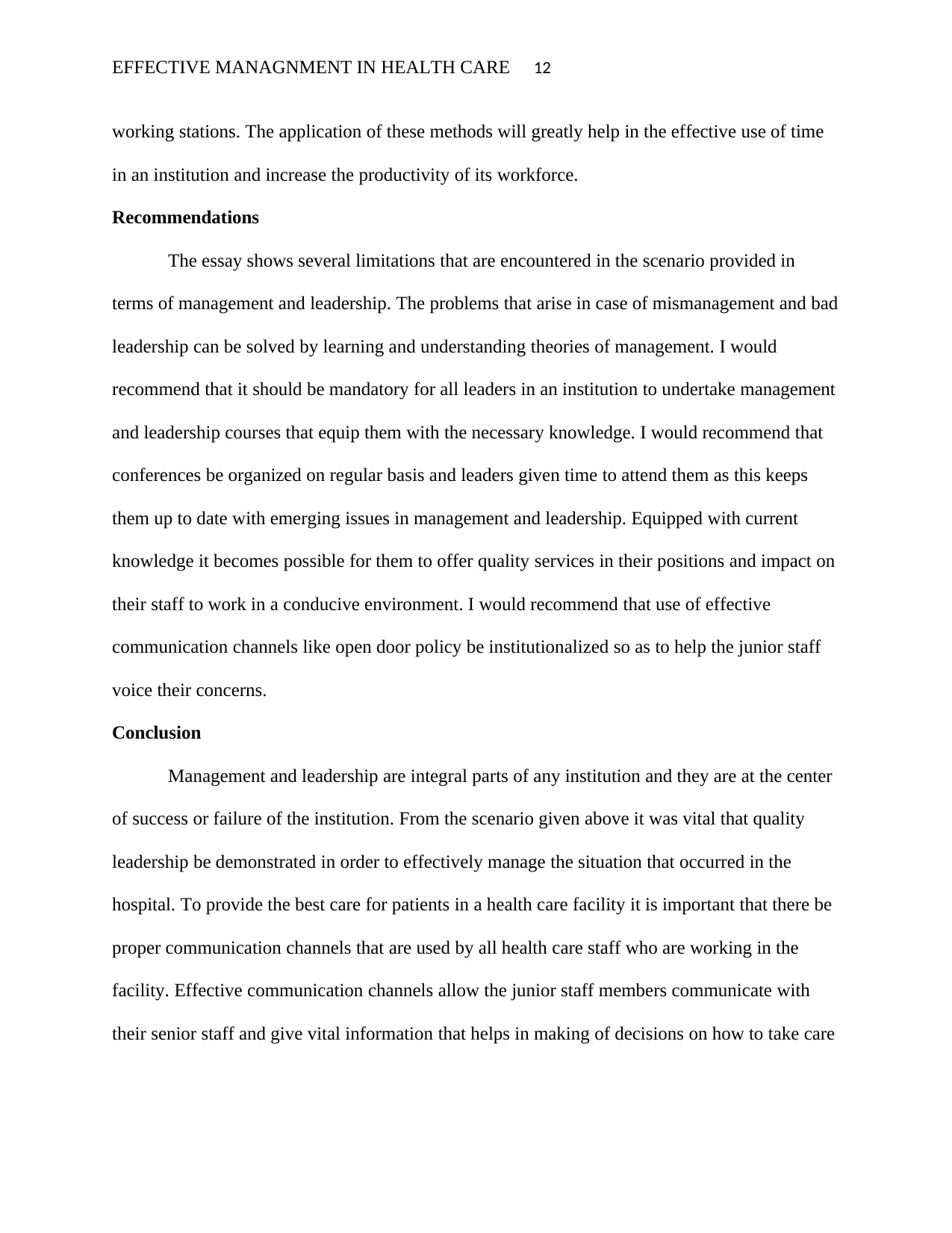
EFFECTIVE MANAGNMENT IN HEALTH CARE 12
working stations. The application of these methods will greatly help in the effective use of time
in an institution and increase the productivity of its workforce.
Recommendations
The essay shows several limitations that are encountered in the scenario provided in
terms of management and leadership. The problems that arise in case of mismanagement and bad
leadership can be solved by learning and understanding theories of management. I would
recommend that it should be mandatory for all leaders in an institution to undertake management
and leadership courses that equip them with the necessary knowledge. I would recommend that
conferences be organized on regular basis and leaders given time to attend them as this keeps
them up to date with emerging issues in management and leadership. Equipped with current
knowledge it becomes possible for them to offer quality services in their positions and impact on
their staff to work in a conducive environment. I would recommend that use of effective
communication channels like open door policy be institutionalized so as to help the junior staff
voice their concerns.
Conclusion
Management and leadership are integral parts of any institution and they are at the center
of success or failure of the institution. From the scenario given above it was vital that quality
leadership be demonstrated in order to effectively manage the situation that occurred in the
hospital. To provide the best care for patients in a health care facility it is important that there be
proper communication channels that are used by all health care staff who are working in the
facility. Effective communication channels allow the junior staff members communicate with
their senior staff and give vital information that helps in making of decisions on how to take care
working stations. The application of these methods will greatly help in the effective use of time
in an institution and increase the productivity of its workforce.
Recommendations
The essay shows several limitations that are encountered in the scenario provided in
terms of management and leadership. The problems that arise in case of mismanagement and bad
leadership can be solved by learning and understanding theories of management. I would
recommend that it should be mandatory for all leaders in an institution to undertake management
and leadership courses that equip them with the necessary knowledge. I would recommend that
conferences be organized on regular basis and leaders given time to attend them as this keeps
them up to date with emerging issues in management and leadership. Equipped with current
knowledge it becomes possible for them to offer quality services in their positions and impact on
their staff to work in a conducive environment. I would recommend that use of effective
communication channels like open door policy be institutionalized so as to help the junior staff
voice their concerns.
Conclusion
Management and leadership are integral parts of any institution and they are at the center
of success or failure of the institution. From the scenario given above it was vital that quality
leadership be demonstrated in order to effectively manage the situation that occurred in the
hospital. To provide the best care for patients in a health care facility it is important that there be
proper communication channels that are used by all health care staff who are working in the
facility. Effective communication channels allow the junior staff members communicate with
their senior staff and give vital information that helps in making of decisions on how to take care
⊘ This is a preview!⊘
Do you want full access?
Subscribe today to unlock all pages.

Trusted by 1+ million students worldwide
1 out of 16
Related Documents
Your All-in-One AI-Powered Toolkit for Academic Success.
+13062052269
info@desklib.com
Available 24*7 on WhatsApp / Email
![[object Object]](/_next/static/media/star-bottom.7253800d.svg)
Unlock your academic potential
Copyright © 2020–2026 A2Z Services. All Rights Reserved. Developed and managed by ZUCOL.




